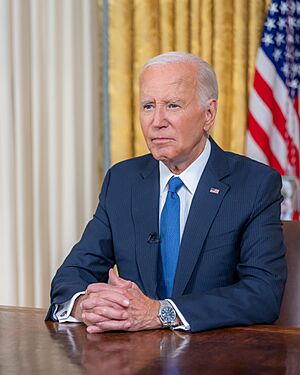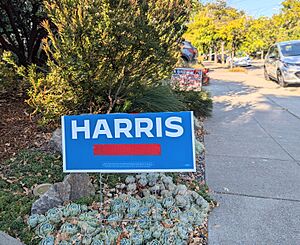Withdrawal of Joe Biden from the 2024 United States presidential election facts for kids
Joe Biden, the current President of the United States from the Democratic Party, announced on July 21, 2024, that he would no longer run for president in the 2024 United States presidential election. He shared this news on social media. Biden then said that Vice President Kamala Harris should become the party's new candidate for president.
Biden had announced his plan to run for re-election on April 25, 2023. Kamala Harris was set to be his running mate again. Biden had won many votes in the 2024 Democratic Party presidential primaries. He was already expected to be the party's candidate before the primary elections ended. However, people had started to worry about Biden's age and health during his time as president. They wondered if he was fit enough for another term.
These worries grew a lot after a debate between Biden and Republican Party candidate Donald Trump on June 27, 2024. Many people criticized Biden's performance. They noticed he often lost his thoughts and gave unclear answers. He also seemed weak, spoke with a hoarse voice, and sometimes forgot facts. After the debate, many Democrats and major news groups asked him to step down. By July 19, 2024, over 30 important Democrats had asked him to withdraw.
For weeks after the debate, Biden kept saying he would stay in the race. But on July 21, 2024, he officially withdrew his candidacy. He posted a signed letter on his X account. He wrote that this decision was "in the best interest of my party and the country." He also said he would continue to serve as president until his term ended. Biden was the first sitting president since Lyndon B. Johnson in 1968 to withdraw from a re-election race. He was also the first since the 1800s to withdraw after serving only one term. He is the only president ever to withdraw after already winning the primary elections.
Contents
Why Presidents Don't Seek Re-election
Historically, most U.S. presidents who finished one full term tried to get a second term. But some presidents chose not to run again. For example, James K. Polk and James Buchanan promised to serve only one term.
The 22nd Amendment to the U.S. Constitution was passed in 1951. It limits presidents to two full terms. Before this rule, many presidents followed a tradition set by George Washington. He chose not to run for re-election after two terms.
Biden's Campaign Goals
On April 25, 2023, Joe Biden confirmed he would run for re-election. Vice President Kamala Harris was his running mate. Biden's campaign focused on several key areas. He wanted to continue economic growth after the COVID-19 pandemic. He often said he wanted to "finish the job."
Protecting American democracy was a main goal for Biden. He also aimed to increase funding for border security and law enforcement. He supported LGBT rights and often mentioned laws he helped pass. These included laws to improve infrastructure, boost science and technology, and fight climate change.
In foreign policy, Biden wanted to make U.S. alliances stronger. He promised to keep supporting Ukraine and Israel. He said this was important for U.S. safety. Biden also wanted to reduce gun violence. He aimed to protect the Affordable Care Act, a healthcare law. He also suggested raising taxes on very wealthy people. This would help reduce the national debt and fund social services.
Biden's trade ideas were different from older policies. He wanted to protect American manufacturing jobs. He did this by adding taxes on certain Chinese products. This was to help U.S. industries and challenge China's growing power.
Biden won many primary elections. He won the New Hampshire primary with write-in votes. He also won South Carolina, Nevada, and Michigan. On March 5, also known as "Super Tuesday," he won 15 out of 16 primary elections. By March 12, he had enough delegates to become the expected Democratic candidate.
Concerns About Biden's Health
Biden was 78 years old when he became president. This made him the oldest person to become president. He was even older than Ronald Reagan was when Reagan left office. During his presidency, people started to worry about Biden's age and health. They questioned if he could handle a second term.
Doctors noted that Biden had "exceptional health" for his age. His personal doctor, Kevin O'Connor, confirmed his good physical health. However, in July 2024, a newspaper reported that a neurologist had visited the White House several times. This caused some discussion, but Biden's doctor said the visits were not unusual.
The Debate and Its Aftermath
Biden faced strong criticism after a TV debate with Donald Trump on June 27, 2024. Many Democrats were unhappy with his performance. He seemed weak, spoke with a hoarse voice, and struggled to remember facts. News columnists often said Trump won the debate. Polls showed most people thought Trump won too. After this, many Democrats asked Biden to withdraw from the race. This led to a lot of political trouble within the party.
After the debate, some important Democratic leaders met with Biden. They told him they were worried about the party losing seats in Congress. Biden reportedly said he needed more time to decide. His campaign also heard that some donors were stopping their funding.
Biden then tested positive for COVID-19. He had mild symptoms like a cough and runny nose. But pictures of him looking frail while traveling fueled more health worries. News reports suggested Biden was becoming more open to withdrawing. On July 20, Biden met with his advisors. They decided that his falling poll numbers and loss of party support meant the campaign could not recover. The next morning, July 21, Biden fully decided to withdraw.
Biden's Withdrawal Announcement
On July 21, Biden's official X account posted a letter. In it, he announced his withdrawal. He wrote, "I believe it is in the best interest of my party and the country for me to stand down and to focus solely on fulfilling my duties as President for the remainder of my term." Later that day, the same account endorsed Kamala Harris as his replacement.
On July 24, 2024, President Biden spoke from the Oval Office. This was his first public appearance since withdrawing. He explained his decision, saying it was for the "defense of democracy." He said that America would have to choose between "moving forward or backward, between hope and hate, between unity and division."
Choosing a New Candidate
When Biden withdrew, his pledged delegates were free to support another candidate. A candidate needs 300 signatures from delegates to be on the convention ballot. To become the nominee, a candidate must get most of the delegate votes at the 2024 Democratic National Convention. If no one gets a majority at first, more delegates called "superdelegates" can vote. Even though Biden endorsed Harris, the rules do not force delegates to follow his recommendation.
However, a survey of delegates by the Associated Press on July 22, 2024, showed that Kamala Harris had already received pledges from more than half of the delegates. This made her the likely new candidate.
See also
In Spanish: Retirada de Joe Biden de las elecciones presidenciales de Estados Unidos de 2024 para niños
 | Leon Lynch |
 | Milton P. Webster |
 | Ferdinand Smith |



